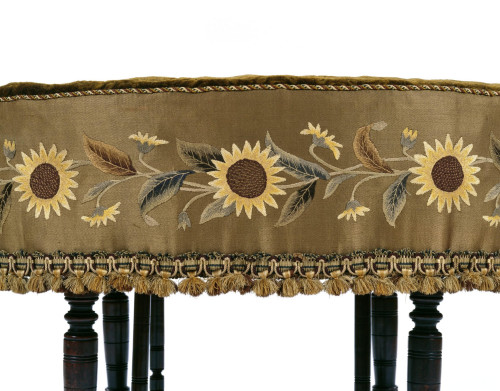35/1999
Collection
Textiles
Brief description
Stamped wool plush and mercerized cotton sateen table cover with a fitted apron, embroidered with sunflowers and stylised geometric flowers, manufactured in c.1890.
Object name
table cover
Object number
35/1999
Production date
c.1890 (manufactured)
Period
Victorian (1837-1901)
Material
sateen
cotton
silk
wool
canvas
cotton
silk
wool
canvas
Technique
embroidered
sewn
stamped
sewn
stamped
Physical description
Table cover, with fitted apron. The table cover has an oval top of stamped wool plush, in moss green, with a single seam running across its longest length. The stamped pattern is comprised of a grid of alternating stylised flowers, one of geometric form with eight diamond shaped petals, the other a tulip like flower on a stem with two leaves within an octagon.
Around the edge of the plush is a twisted silk rope braid in five colours. From this the apron (or pelmet border) falls vertically, and is of olive green mercerized cotton sateen. It is embroidered with a running band of sunflowers, an open flower, three buds and foliage repeated approximately every 25 cm, and has slight variations on each repeat. It is embroidered mainly in satin stitch and stem stitch in approximately 11 colours of mercerized cotton filoselle thread. There is a single seam down the apron in line with the seam across the plush top. Around the bottom edge of the apron is an elaborate tasselled galloon braid, probably machine woven, in 8 different colours. The apron is stiffened, probably with French canvas. The whole is hand stitched together and lined with an olive green/brown cotton twill fabric.
Around the edge of the plush is a twisted silk rope braid in five colours. From this the apron (or pelmet border) falls vertically, and is of olive green mercerized cotton sateen. It is embroidered with a running band of sunflowers, an open flower, three buds and foliage repeated approximately every 25 cm, and has slight variations on each repeat. It is embroidered mainly in satin stitch and stem stitch in approximately 11 colours of mercerized cotton filoselle thread. There is a single seam down the apron in line with the seam across the plush top. Around the bottom edge of the apron is an elaborate tasselled galloon braid, probably machine woven, in 8 different colours. The apron is stiffened, probably with French canvas. The whole is hand stitched together and lined with an olive green/brown cotton twill fabric.
Dimensions
Depth: 25cm
Length: 98cm
Width: 90cm
Length: 98cm
Width: 90cm
Website keywords
Decoration and furnishings
textiles
textiles
Label
Label text for 1890 Period Room (Room 7), Geffrye Museum, 2010:
Wallpaper and textiles
This is the type of decorative scheme recommended by household manuals published at this period, which advised people on how to furnish their homes in the ‘artistic’ manner. The patterns are stylised rather than naturalistic, and the muted colours are intended to create an overall impression of harmony. Elaborate drapes and fitted carpets were criticized by the advice manuals, partly because they were difficult to keep clean and also because they were at odds with the simpler look of the artistic style. They were replaced by curtains with straight drops and Eastern rugs placed directly onto the floorboards. The table cover, fitted neatly to the table top, has an apron embroidered with sunflowers, one of the principal motifs of the Aesthetic Movement.
Table cover, stamped wool plush with a mercerised cotton sateen apron, c.1890
Wallpaper and textiles
This is the type of decorative scheme recommended by household manuals published at this period, which advised people on how to furnish their homes in the ‘artistic’ manner. The patterns are stylised rather than naturalistic, and the muted colours are intended to create an overall impression of harmony. Elaborate drapes and fitted carpets were criticized by the advice manuals, partly because they were difficult to keep clean and also because they were at odds with the simpler look of the artistic style. They were replaced by curtains with straight drops and Eastern rugs placed directly onto the floorboards. The table cover, fitted neatly to the table top, has an apron embroidered with sunflowers, one of the principal motifs of the Aesthetic Movement.
Table cover, stamped wool plush with a mercerised cotton sateen apron, c.1890




















